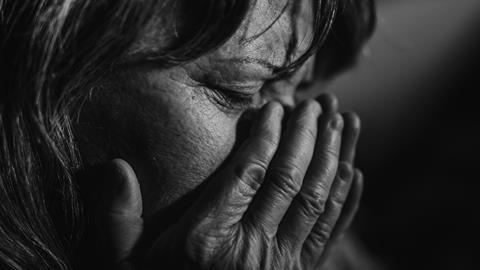Ann-Louise Graham unpacks the uncomfortable, disturbing and often hidden subject of domestic abuse among Christians and explains the misapplication of scripture by perpetrators
The subject of domestic abuse within the Christian faith is heartbreaking, complex and multi-layered. Domestic abuse happens across church denominations, and is not confined to any one particular teaching. Darby Strickland, a biblical counsellor with the Christian Counselling and Educational Foundation [CCEF] has decades of experience working in this area. She comments: “No matter our theological system, complementarian or egalitarian, there are always people who desire [control]…people exploit whatever system they are in.”
Disturbingly, the types of abuse Christian women suffer are the same as those found in the general population – physical, emotional and sexual abuse, but they also suffer the added dimension of spiritual abuse, as a potential means to control, shame or punish, as Strickland explains: “[It’s] when someone is seeking to control and dominate, but they’re either using scripture or doctrine or their leadership roles as a weapon over their spouse.” In 2022, Christian charity Restored participated in a research project led by the University of Chester, into responses to domestic abuse in the Christian faith community. In the report entitled, ‘Developing understanding and effective responses to domestic abuse in the Christian faith community’, 71 per cent of respondents acknowledged that scripture played a role in their abuse, whether or not the abuser was a Christian. Overall, 90 per cent of perpetrators were male and over half [56.7 per cent] were Christians according to ‘In churches to’, an earlier report from 2018. Despite the size of the problem, it appears hidden, with less than 40 per cent of church goers likely to believe it happens in their church, according to the Restored-commissioned report.
Domestic abuse defined
Domestic abuse isn’t just bad or sinful behaviour; biblical counsellor and author Anne Dryburgh acknowledges that, while definitions can be tricky, abuse will always involve a power imbalance where one person seeks to control another leading to dependency: “Emotional abuse is any non-physical behaviour designed to control, intimidate, subjugate, punish or isolate another person.” According to Restored, emotional abuse is the most commonly experienced form, with 94 per cent of respondents experiencing it.
Abuse will normally involve a pattern of behaviour that isn’t just related to differences in roles, as Helen Thorne, a biblical counsellor with Biblical Counselling UK [BCUK], explains: “In abusive situations you’re not just looking for two people arguing. You are looking for that power imbalance and you are looking for that sense of one person not having a voice, one person not being able to seek help very easily. One person facing consequences for struggling, for speaking and the other person really not so much at all.”
Strickland says the word oppression captures something of the domination that takes place in an abusive relationship, which often involves one spouse making the other responsible for their happiness. “Behaviours can be physical, sexual, emotional, financial spiritual; those would be the main aspects…of control.”
And while men do suffer from domestic abuse, the 2023 report indicated: “women experience abuse that is more frequent, more severe and has more serious impacts”.
Why is it happening?
While it’s difficult to comprehend why someone would ever want to dominate another person, there appear to be several factors that may maintain domestic abuse within the Christian faith.
Sadly, the misuse of scripture appears to play a role, as reflected in the research by Restored. In particular, teaching on male headship, submission, divorce and forgiveness when misappropriated may contribute to domestic abuse, which highlights the importance of handling key passages well. Helen Thorne points out that the headship language found in passages such as Genesis 1 and 2 or 1 Corinthians 11 may be misused to subjugate another person and when that happens it risks distorting the picture of biblical headship: “People that you know genuinely love Jesus will know that headship is not a controlling headship. It is a partnership where two people are equal, but have different roles; no one has the right to grind the other one down.”
We need to understand that false allegations are rare, so should believe the person making a disclosure
Strickland describes hyper-headship, which she says goes beyond being a good shepherd to where women are told that questioning their spouse is like questioning God: “I think what is so hard for victims is because scripture or doctrine is used in this way, they feel actually that God is telling them these things and so it becomes really confusing for them to distinguish what God says from the voice of their oppressor.”
In terms of submission, Dryburgh points out that traditionally women are told that unless their husband is asking them to sin, they should submit to them. However, in the hands of an abuser submission is misused. Giving the example of a woman whose husband asked her to send him an email every five minutes, she points out: “Sin is not just lying or stealing; it’s the whole aspect of control” and in this case the husband prevented his wife from fulfilling her God-given responsibilities. “It would be wrong to be submissive to it…and it is right to get help.”
Dryburgh explains that biblical headship and submission should involve love and service towards another: “Headship is not a power. It’s not a king sitting on a throne handing out orders. All responsibility or authority in the Bible is to love and serve for the wellbeing of the other. Husband to wife, parents to children, spiritual leaders to church members.”
In addition to these areas, however, other biblical teachings may be used to minimise abuse, such as teaching on forgiveness and bearing with one another, which, as Helen Thorne points out, can be taken out of context: “Forgiveness doesn’t mean silence. Forgiveness doesn’t mean burying sin. We’re called to bring dark things into the light, so people can be helped to change; forgiveness doesn’t mean just knuckling under and not seeking justice. So, all these beautiful verses are saying something right, but they just get warped a little bit and the cumulative effect of that can be very dangerous.”
Strickland indicates that abusers often cut women off from their friends, even preventing them from attending Bible studies, while purposefully shaming them. “I can think of many victims who I talked to where their spouse will pray for them, but they pray, ‘help me tolerate you. I don’t know how God can. You’re such a sinner! God is displeased with you’, which is the opposite of Ephesians 5:26, washing someone with the water of the word and presenting them pure.”
While not denying the importance of Christian marriage or the horrible nature of divorce, Strickland says that part of the problem lies in the fact that we fail to acknowledge how abuse actually breaks the covenant of marriage. “People fail to recognise that desertion doesn’t just mean removal from a common space. It can also be dereliction of duty…I think it’s just the lack of clarity on understanding what covenant breaking behaviour is and when a relationship stops
being a marriage…If we understood that marriage was supposed to glorify God and be a picture of Jesus in his Church. Abusive marriages are nothing like that.”
How do we respond?
The issue of domestic abuse within the Christian faith provokes not only shame on an individual level, but also corporately, and we could be tempted to treat it as the world’s problem, not ours. The reports mentioned here recognised some improvements in how the Church handles domestic abuse, but suggests that there is still a strong need to address the issue more proactively in order to make our churches safe places for disclosure and support.
But how should we respond to this problem while maintaining what the Bible teaches on marriage? Helen Thorne says that the Church begins to address the problem by first acknowledging that it’s real and developing a culture where it’s safe to talk. We need to understand that false allegations are rare, so should believe the person making a disclosure. She suggests simple, but practical, steps such as putting a poster on the back of a toilet door or a book on a church bookshelf, which sends a signal that God and the Church has something to say about domestic abuse.
Clearly, however, there’s also the very serious matter of ensuring that our teaching on key passages is handled with diligence. All of the women I spoke to made it plain that we need to draw on the whole counsel of scripture. For example, Thorne says we need to take “care on how we preach, how we lead Bible studies so when we do get to those trick passages on marriage and submission and bearing with one another we actually go in with nuance”. She adds: “The general trajectory in the Christian life is a trajectory of forgiveness, but actually, forgiveness doesn’t mean giving up on justice. Bearing with one another doesn’t mean allowing ourselves to be a doormat, you know it’s both [forgiveness and justice]. We take the whole of scripture, the whole council of God and see how the different parts interplay with one another.”
Creating a culture where disclosure is possible is fundamental, hence the need to equip pastors and indeed the whole Church to respond well. And, as Dryburgh points out, disclosure needs to be met by a church that understands the dynamics of abuse. “I would never ask a woman to do that [disclose] on her own. They need a lot of support, someone with them all of the time and this is where it gets hard. Men need to be involved.”
This is a sentiment echoed by Strickland, who stresses that when churches fail to understand the depth of the oppression that a woman is experiencing, they risk keeping them in an abusive situation. “We don’t know what it’s like to live in the home and we try to solve the argument. The oppressed person will do anything that they’re told to do. Be quieter, talk more gently…and no one is really helping her get a picture of the dynamics of abuse that are in her home.” She continues: “We can focus on solving the problem or we can be willing as Christians to become curious and lean in and see the extent of the problem by asking more questions…that’s uncomfortable for us, but I think it is really important.”
Input from secular agencies and safeguarding is also key and yet less than 30 per cent of those who disclose are referred to outside agencies, according to the 2023 report. But practical care is key: “It’s only the secular services that can provide housing or legal support or police intervention to support for the children. We do need [these] services” says Thorne. Another fundamental need is to build up the abused, replacing the shame of abuse with love while helping them to recognise who they are in Christ. They need to know they are valued, loved, chosen and that God is a God of hope – he wants them to be safe.
Ultimately all of the women I spoke to, both on the record and off, stressed the importance of bringing this problem into the light. As Helen Thorne explains: “Keeping abuse silenced and covered up brings the gospel into far more disrepute than saying, ‘God is a God of justice. God is a God of mercy, and we are going to pursue that God of justice and mercy by helping abused women find safety and abusing men to change’ – that commends the gospel. Keeping it quiet is a disgrace to the gospel.”

Responding to domestic abuse
Here are four ‘Rs’ to remember when supporting someone who discloses abuse (taken from the 2018 report).
Recognise
• that abuse does happen in Christian relationships
• the signs of power and control in a relationship
Respond
• “I believe you” is a helpful first response
• within your limitations and the safeguarding framework (especially if children are involved)
Refer
• to the national domestic violence helpline: 0808 2000 247
• to local professionals – accompany her if you can
Record
• dates/times and quotes of what has been said
• your actions and any concerns you may have and keep the notes in a secure place
HELPFUL RESOURCES Helpful resources
Publications
Oakley & Wright (2023) ‘Developing understanding and effective responses to domestic abuse in the Christian faith community’.
Aune & Barnes (2018) ‘In Churches Too: Church responses to domestic abuse – a case study of Cumbria’.
Dryburgh, A. (2022) The Emotional Abusive Husband: Its effects and how to overcome them in Christ, Illumine Press.
Strickland, D. (2020) Is It Abuse? A biblical guide to identifying domestic abuse and helping victims, P & R Publishing.
Thorne, H. (2018) Walking With Domestic Abuse Sufferers (Gospel Hope for Life Series), IVP.
Websites
biblicalcounselingcoalition.org/2018/08/15/abuse-three-important-truths-when-helping-the-abused/
Ann-Louise Graham is a writer, biblical counsellor and author of The Anxiety Lie – a Christian Woman’s Roadmap to Freedom. ann-louisegraham.com
If any of these issues have affected you, you can call Premier Lifeline for support. Premier Lifeline is a national, confidential helpline offering a listening ear, emotional and spiritual support from a Christian perspective. If you would like someone to talk with and pray for you, call Premier Lifeline on 0300 111 0101.


































No comments yet